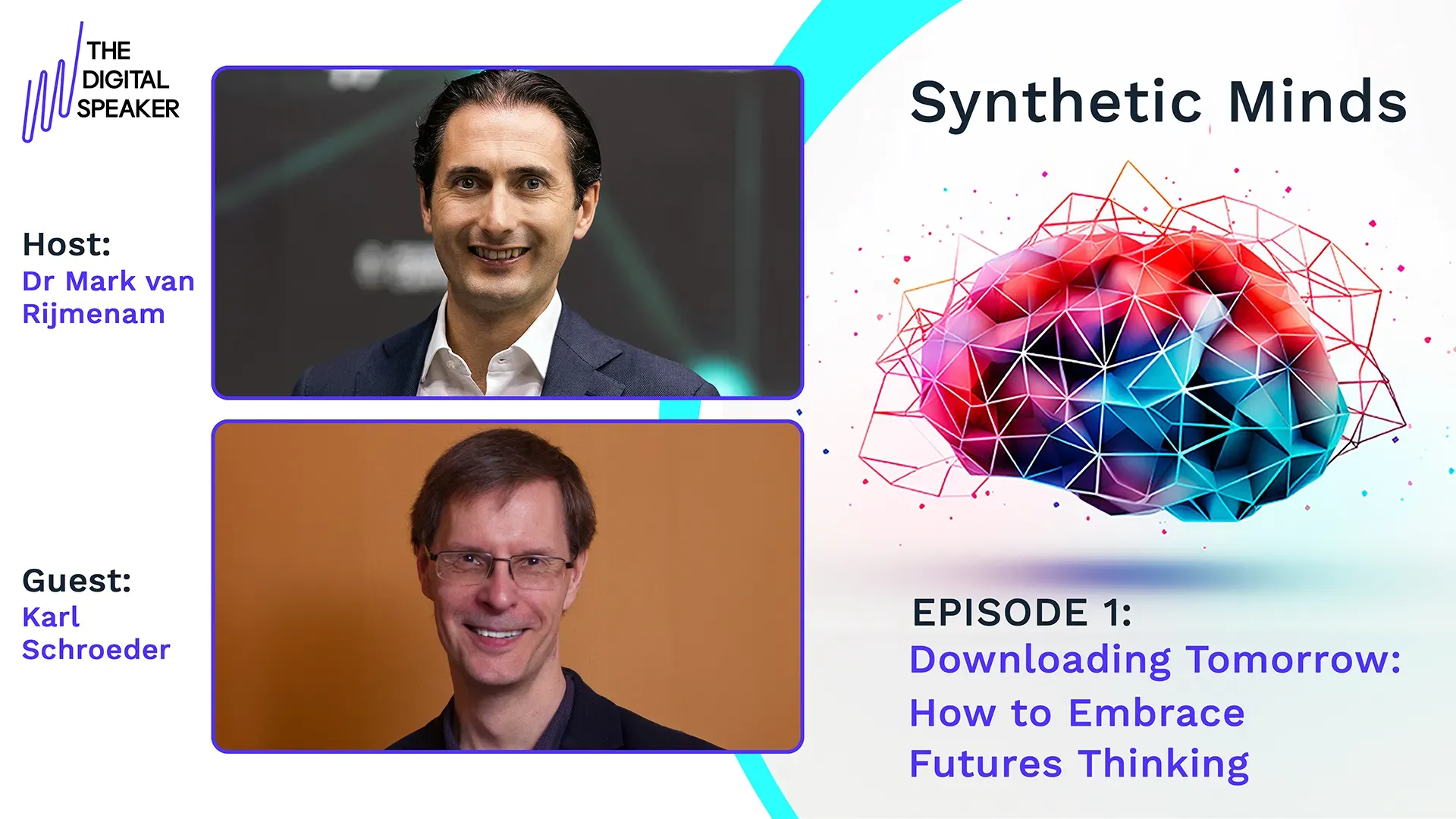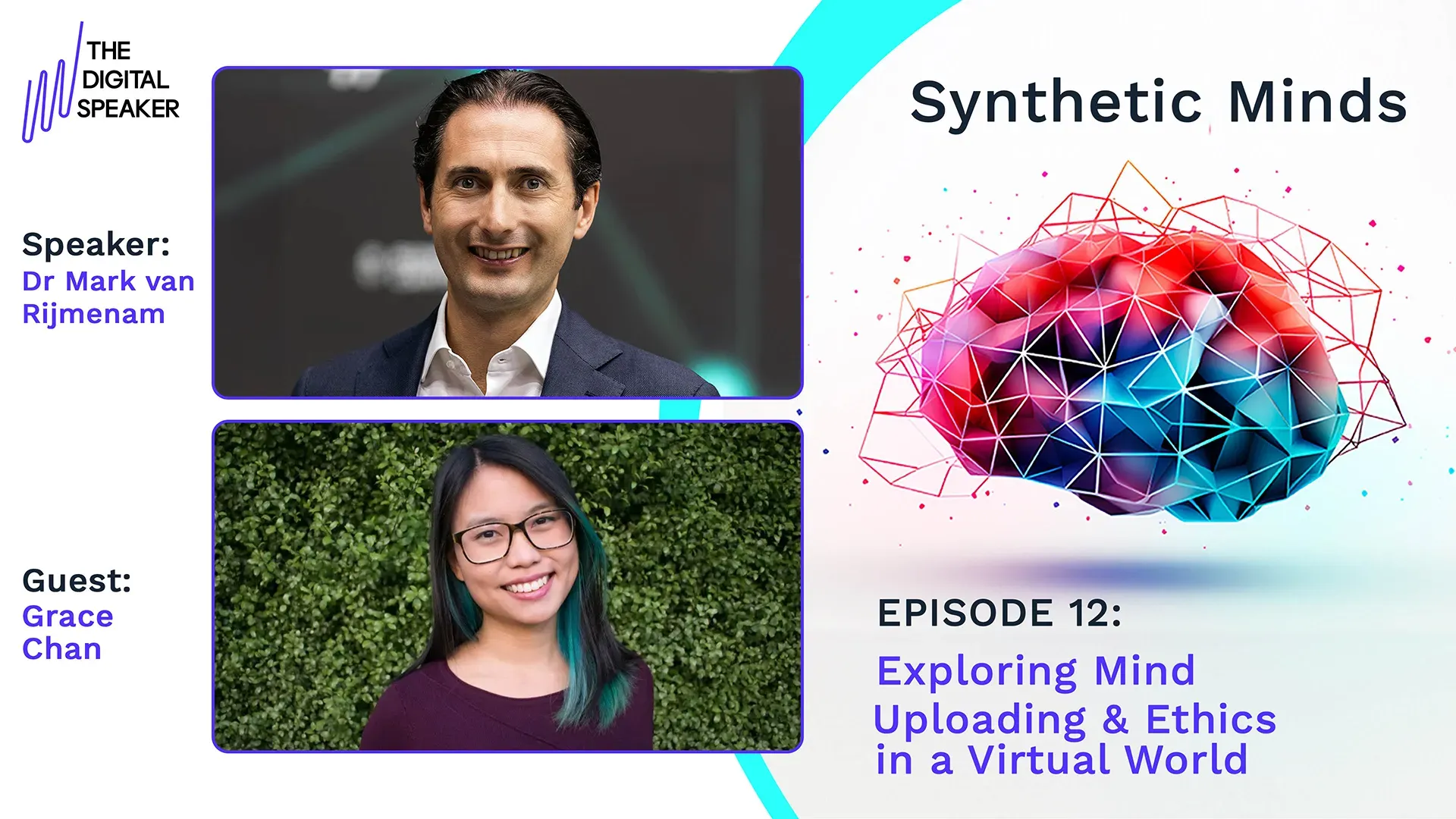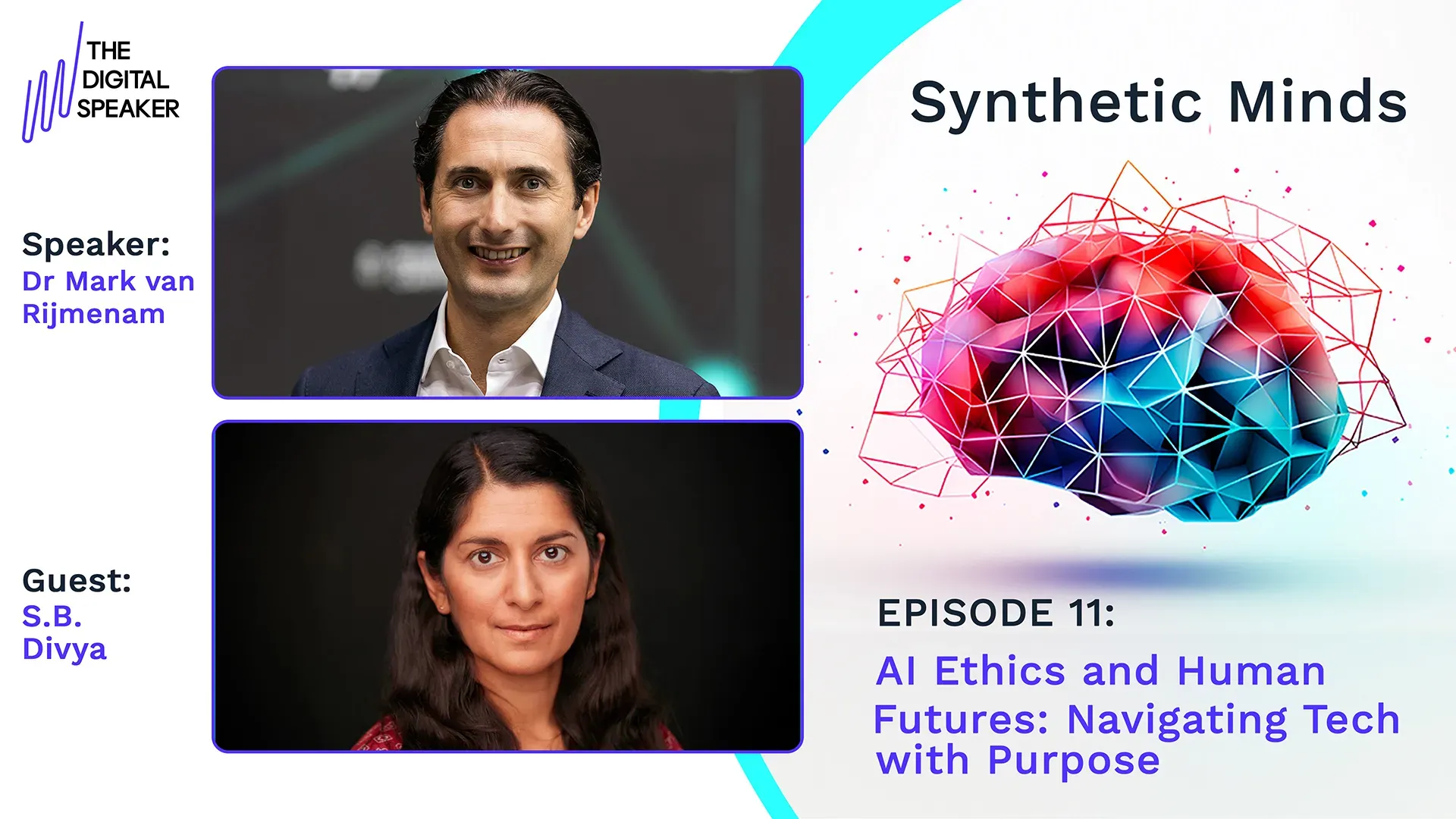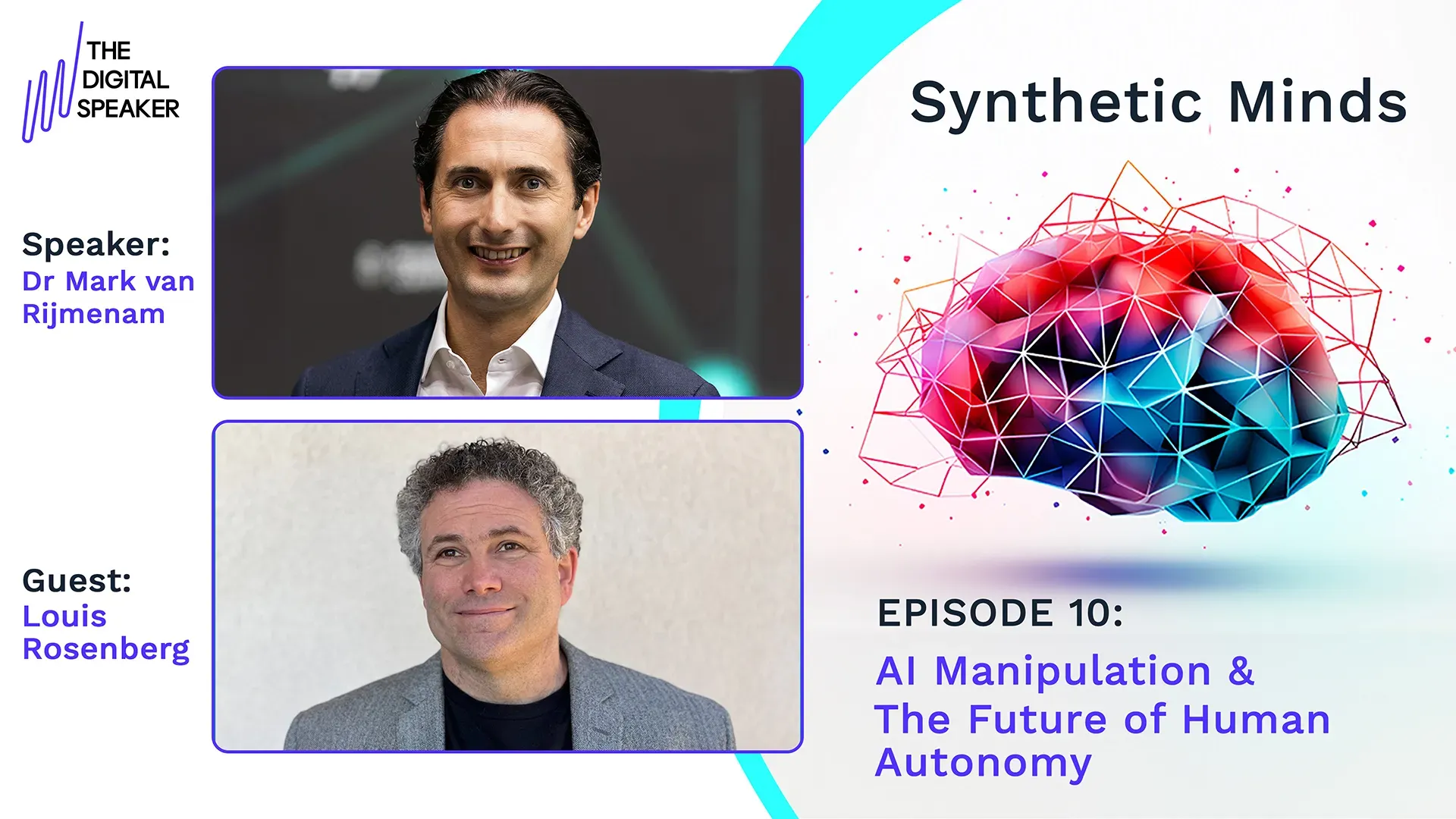Downloading Tomorrow: How to Embrace Futures Thinking with Karl Schroeder - Synthetic Minds Podcast EP01

In the rapidly evolving world of technology, it's becoming increasingly crucial for organisations and individuals alike to embrace futures thinking. By envisioning potential scenarios and examining the implications of emerging innovations, we can better prepare for the changes that lie ahead.
The line between what's envisioned and what becomes reality is increasingly blurred in the ever-evolving landscape of technology and fiction. Karl Schroeder, a seasoned science fiction writer and strategic foresight consultant, dives deep into this interplay in the first episode of the new Synthetic Minds podcast. Hosted by Dr. Mark van Rijmenam, this discussion explores Schroeder's literary contributions. It delves into how his speculative insights can be applied in real-world contexts, especially within organisations striving to adapt to future technological landscapes.
We explored the role of science fiction in shaping our understanding of the future, the potential impact of technologies like AI and mixed reality, and the importance of governance in navigating the complexities of our ever-changing world.
The Power of Science Fiction in Futures Thinking
Science fiction has long been a vehicle for exploring the possibilities and consequences of emerging technologies. As Schroeder explains, the narrative form allows writers to play out various ideas against one another, revealing unexpected interactions and societal implications that might otherwise go unnoticed. By weaving technologies like AI, blockchain, and mixed reality into engaging stories, authors like Schroeder can provide a glimpse into the future that goes beyond mere speculation.
His novels, such as "Stealing Worlds" and "Lady of Mazes," offer more than just escapism—they propose scenarios that could very well materialise in the coming decade(s). These stories are grounded in extensive research and personal engagement with forward-thinking projects, providing a unique blend of narrative foresight and practical speculation.
Schroeder argues that science fiction should be embraced as a mainstream tool in foresight practices. By translating foresight findings into narrative elements, organisations can better communicate and understand the potential impacts of their decisions. This approach acknowledges the human brain's innate tendency to think in narrative terms, making science fiction a powerful means of conveying complex concepts and preparing for the future.
The Implications of Converging Technologies
In "Stealing Worlds," for example, Schroeder integrates concepts like blockchain, AI and mixed reality to explore alternative economic and governance systems and societal structures. This book, among others, reflects his belief that technology can fundamentally alter our governance models and personal freedoms, themes that resonate strongly with contemporary technological debates. Schroeder paints a vivid picture of a future where our reality is fundamentally altered.
Schroeder's depiction of a decentralised, blockchain-based economy challenges traditional economic systems, suggesting a radical shift in allocating and governing resources. Furthermore, the role of AI agents in this new paradigm raises questions about the relationship between humans and artificial intelligence and how governance structures might evolve to accommodate these new entities.
Schroeder's insights into AI challenge the conventional views of technology as mere tools, suggesting instead that they could become autonomous agents with significant social influence. This perspective is crucial for organisations as they plan for futures where AI could dictate business strategies and cultural and ethical norms.
The Importance of Governance in an Era of Rapid Change
Schroeder also touches on the unintended consequences of technology, such as the paradoxical effects of social media on the community and the challenges of maintaining personal privacy in an interconnected world. These considerations are vital for leaders navigating the complex web of technological benefits and societal risks.
As Schroeder emphasises, the challenges we face in this era of rapid technological advancement go beyond technological challenges but are fundamentally political and governance-related. The question of how we govern ourselves and our technological creations becomes paramount, as the traditional frameworks and languages we've relied upon may no longer suffice.
Schroeder posits that organisations will thrive insofar as they remain grounded in serving the real needs of the physical world rather than becoming detached from reality. Governance, he argues, is the "killer app" of the next generation, and a solution to this problem has yet to emerge.
Strategic Foresight for Organisational Adaptation
Strategic foresight will be a recurring theme in this podcast, emphasised through Schroeder’s application of science fiction principles to real-world strategic planning. This approach is about predicting specific outcomes, understanding a range of possibilities, and preparing accordingly, which is essential for organisations facing uncertain futures.
Schroeder elaborates on using narrative tools to translate foresight findings into actionable strategies. This method involves crafting stories that simulate potential future scenarios, allowing organisations to visualise the complex interplay of various technological, economic, and social factors.
This concept of “narrative foresight” is a powerful tool for businesses to explore potential futures in a controlled, impactful manner. Schroeder’s technique ensures that each narrative element aligns with strategic insights, thereby enhancing the decision-making process within organisations.
Conclusion
As we continue to step into the realms of what was once considered purely speculative, the narratives and ideas discussed by Schroeder offer a crucial framework for understanding and leveraging the transformative power of technology. By embracing the power of storytelling and futures thinking, organisations and individuals can better navigate the complexities of our rapidly evolving technological landscape.
As Schroeder eloquently states, "To really get a handle on what's coming in the near future, business leaders have to be brave enough to read the writers who are writing now [instead of reading the science fiction written decades ago] and find out what they are writing about." It is through this willingness to engage with the visions of today's science fiction that we can begin to build the dreams of tomorrow, today.
This episode is a must-listen for anyone interested in the intersection of fiction, technology, and future strategic planning, providing a comprehensive guide on navigating the complexities of tomorrow’s technological landscape.
Biography Karl Schroeder
Karl Schroeder is an award-winning author and a member of the Association of Professional Futurists. He writes to entertain and also as a way of analysing and anticipating the future for institutional clients as diverse as governments, consultancies and multinational corporations. He is an engaging public speaker who has given talks about the intersection of technology and culture across North America, Europe and Eurasia. His current project is a near-future adventure novel about Arctic sovereignty and climate change. Karl lives in Toronto, Canada, with his wife and daughter.
Links
Newsletter: kschroeder.substack.com
Website: www.kschroeder.com
Books
Stealing Worlds - 2019
Lady of Mazes - 2006















